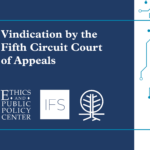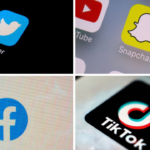
Published January 24, 2023
The effortless availability of pornography in every home in America would have been inconceivable twenty-five years ago. Only adult bookstores or similar venues sold such materials, and parents could more easily control what entered their homes and what material their children purchased and viewed. The internet and smartphones undercut parents, making images of all types available to children with little effort and considerable privacy. To control pornography from flowing into their homes, parents would have to cut their children off from the internet, monitor all smartphone use, and/or install filtering technologies that are difficult to use and often easily circumventable.
The States have largely stayed out of the fight against internet pornography. Yet, they have power to regulate obscene and indecent content within their state boundaries. The following provides four legislative proposals:
- While section 230 of the Communications Decency Act of 1996 protects the transmitters of obscene or indecent materials on the internet, states retain the power to make the original senders of such materials legally liable.
- The States could require websites to obtain age verification if they publish or distribute indecent material to children within the state’s borders.
- The States regulate contract law and can require parental consent for creating an account on any platform, including those that distribute pornography, such as Twitter.
- The States can create right to publicity for individuals to control images of their naked bodies used for commercial purposes.
The following outlines these legislative proposals.
1. Transmitting Obscene or Indecent Material to Children Within the State
In the early days of the internet, Congress passed the 1996 Communications Decency Act which made the “knowing transmission of obscene or indecent messages to any recipient under 18 years of age” or the “knowing sending or displaying of patently offensive messages in a manner that is available to a person under 18 years of age” a crime. In Reno v. ACLU, (1) the Supreme Court ruled these restrictions unconstitutional, finding its prohibitions so vague that they would limit First Amendment-protected speech.
But Reno rested on several factual grounds that now seem quaint—if not tragically wrong. To take one example, the Reno Court found that “the Internet is not as ‘invasive’ as radio or television… [and] that [c]ommunications over the Internet do not ‘invade’ an individual’s home or appear on one’s computer screen unbidden. Users seldom encounter content by accident… [and] odds are slim that a user would come across a sexually explicit sight by accident.” (2)
Given the Court’s antiquated justifications—and given that it has never been tried, a state could simply pass a law prohibiting sending of obscene material into the state or indecent material to children. Unfortunately, due to Section 230 of the Communications Decency Act, 47 U.S.C. § 230, the states cannot bring action against internet platforms that allow others to upload pornography. These platforms are a popular, if not the dominant form of sharing obscene images. However, states could go after the original sender or publisher of such materials and who use those platforms to transmit obscene or indecent material to minors.
2. State Age Verification Laws
Under current law, age verification requirements for minors visiting pornographic sites are unconstitutional. Because the Supreme Court found that “filters are more effective than age-verification requirements,” it struck down in 1997 in Ashcroft v. ACLU, the Child Online Protection Act (COPA), (3) which required sites with material “harmful to children” to obtain age verification. (4) Given the manifest ineffectiveness of filters and the introduction of smartphones, which became widespread a decade after the ruling, the Supreme Court might now revise its decision. State law could prompt that change by specifically challenging the precedent set in Ashcroft.
State legislatures could pass laws to require websites that in their regular business, create or host obscene content, child pornography, or other content harmful to minors to use age verification measures to ensure that any users of the platform in that state are not minors. Such a law would:
- Require such websites to adopt age verification measures that verify the age of individuals attempting to access them and prevent access by minors.
- Permit websites to choose the best verification measure for their service that effectively prohibits minors from accessing them, such as adult identification numbers, credit card numbers, a bank account payment, a driver’s license, or another identification mechanism.
- Rely upon the many age verification systems that exist commercially that protect privacy.
- Protects against privacy violations for failing to protect information obtained from the age verification process.
- Impose a civil penalty for any violation of the law, and each instance that the website failed to perform reasonable age verification methods to restrict a minor’s access could constitute a separate violation.
- Include a private cause of action as an enforcement mechanism where, for example, parents could sue for damages for exposing their children to harmful material.
3. Online Account Parental Consent
Contract law is, for the most part, state law, and states could prohibit a social media company or website from making any account, subscription service, or contractual agreement with a minor under 18 years old in their state absent parental consent. A tremendous amount of pornography is distributed through account-based services, such as Twitter.
As a general rule, all contracts by a minor are valid but with certain exceptions are voidable. (5) And even though a minor can void most contracts entered into, most jurisdictions have laws that hold a minor accountable for the benefits he received under the contract. (6) Because children can make enforceable contracts for which parents could end up bearing responsibility, it is a reasonable regulation that parental consent would be required for such contracts. While few courts have addressed the question of the enforceability of online contracts with minors, the handful of courts that have held the contracts enforceable on the receipt of the mildest benefit. (7)
Further, at least in the context of solicitations by mail, the Supreme Court has upheld laws against First Amendment challenge that allow parents to prohibit mailings from sources known to send sexual or otherwise non-family-friendly solicitations. In Rowan v. U.S. Post Off. Dep’t, (8) the Supreme Court upheld Title III of the Postal Revenue and Federal Salary Act of 1967 (9) under which a person may require that a mailer remove his name from its mailing lists and stop all future mailings to the householder.
Our proposed state law would require that:
- Any contract, agreement, or similar relationship between a minor and a social media platform or other interactive computer service must receive informed parental consent.
- A valid consent must be signed, stating the name and address of the adult authorized to provide the consent (i.e. more than just checking a box, which would be easy for a child to do without parents knowing). As long as an interactive computer service has a contract or agreement with a child, it must keep the original consent on file.
4. Right-of-Publicity and Naked Bodies
States, most prominently California (10) and Indiana, (11) have statutes that extend rights of publicity over one’s personality, including one’s physical appearance or attributes. These statutes give individuals legal redress for misappropriation of personality, name, or likeness commercially or otherwise, without consent; and in a manner that results in injury to the individual.
Movie stars and other celebrities typically use this right to prevent the unauthorized use of their images in advertisements or other unconsented appropriations. However, in the internet age, the law of protection has expanded to the non-famous—whose images are used for commercial gain. (12)
States could pass statutes giving people a right of publicity for their naked bodies—and place very burdensome limits on alienating that right, perhaps prohibiting its permanent alienation or extending permanent rights of rescission. Thus, a porn actress could not permanently sign away her rights to control images of her naked body to a porn company—but rather its right to distribute the movies in which she appears would be dependent upon her yearly approval. In addition, publicity rights can protect victims of revenge porn and other unauthorized naked photographs, such as those taken surreptitiously in bathrooms or locker rooms. These photographs have emerged from the locker room, hospital, and other situations where privacy torts or other remedies are inapplicable or impracticable. (13) While such laws would face First Amendment scrutiny, the success of “revenge porn” laws, which also prohibit the internet transmission of intimate pictures, suggests they have a good chance of withstanding constitutional review. (14)
Such a law would contain the following provisions:
- Define an individual’s right of publicity as including the portrayal of his or her naked body.
- Prohibit the commercial use of an individual’s right of publicity for a commercial purpose during his or her lifetime or for one hundred (100) years after the individual’s death without having obtained previous written consent.
- Limit the validity of any such consent to 3 years.
Resources
Endnotes
1. 521 U.S. 844 (1997).
2. Reno, 521 U.S. at 869.
3. Pub. L. No. 105-277, 112 Stat. 2681-736 (1998) (codified at 47 U.S.C. § 231 (2000)).
4. 542 U.S. 656, 668 (2004).
5. § 10:1. The right of a child to make contracts and disaffirm them, 1 Leg. Rts. Child. Rev. 3D § 10:1 (3d ed.)
6. E. Allan Farnsworth, Contracts § 4.5 (4th ed. 2004).
7. A.V. v. i-Paradigms, Limited Liability Company., 544 F.Supp.2d. 473 (E.D.Vir. 2008), aff’d 2009 WL 1015145 (4th Cir. 2009); E.K.D. ex rel. Dawes v. Facebook, Inc., 885 F. Supp. 2d 894 (S.D. Ill. 2012)
8. 397 U.S. 728 (1970).
9. 81 Stat. 645, 39 U.S.C. § 4009 (1964 ed., Supp. IV).
10. Cal. Civ. Code § 3344.
11. Ind. Code Ann. § 32-36-1-1.
12. Gabiola v. Sarid, No. 16-cv-02076, 2017 WL 4264000, at *2 (N.D. Ill. Sept. 26, 2017).
13. Adam Candeub, Nakedness and Publicity, 104 Iowa L. Rev. 1747, 1752 (2019).14. See National Association of Attorneys General, An Update on the Legal Landscape of Revenge Porn, Nov. 16, 2021, available at https://tinyurl.com/4drykaxv.
14. See National Association of Attorneys General, An Update on the Legal Landscape of Revenge Porn, Nov. 16, 2021, available at https://tinyurl.com/4drykaxv.
Clare Morell is a Senior Policy Analyst at the Ethics and Public Policy Center, where she directs EPPC’s Technology and Human Flourishing Project. Prior to joining EPPC, Ms. Morell worked in both the White House Counsel’s Office and the Department of Justice, as well as in the private and non-profit sectors.












